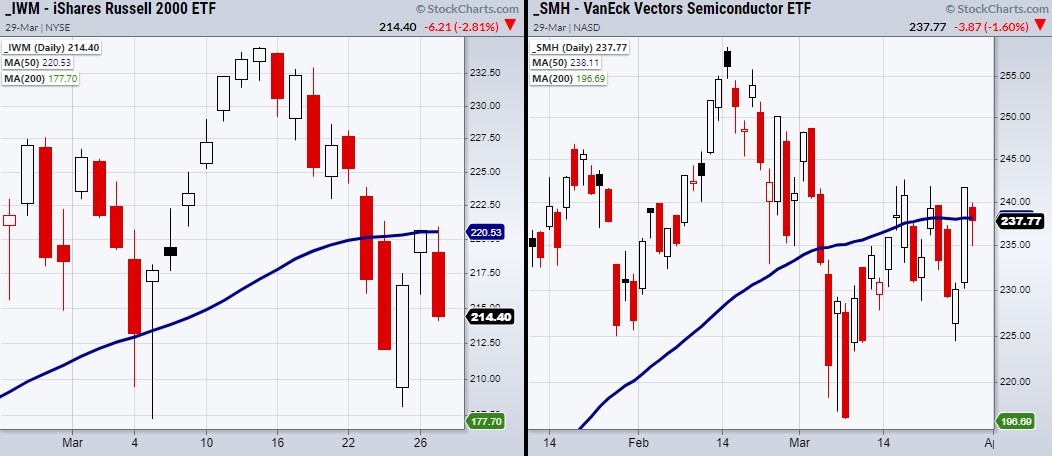In this article, Forrest Crist-Ruiz, assistant director of trading research and education at MarketGauge.com, considers how to avoid being disappointed when expectations don’t match reality.
Last Friday, the iShares Russell 2000 ETF [IWM] and VanEck Vectors Semiconductors ETF [SMH] cleared their 50-day moving averages (DMAs).
From a technical standpoint, it looked as though the rally would continue into Monday. At least that is what traders and investors were hoping for when they bought near Friday’s close.
Monday’s price action turned out quite different.
So, was it wrong for people to expect the market to open higher on Monday?
Not necessarily. Although we all trade with the expectation of making money, we must strategise with the expectation of losing money.
In other words, it is necessary to have a risk plan for every trade you take and position size accordingly.
For instance, if someone had taken a trade based off IWM clearing its 50-DMA and come Monday the market gapped below, then it is easy to see what they expected was wrong.

Therefore, trading off of phase changes is best when you have a second day confirmation.
Because IWM did not close a second time over the 50-DMA, the bulls have two choices.
Watch for IWM to make a second attempt to clear its 50-DMA, or set a stop loss at the nearest support level.
MarketGauge’s advice is to have a stop loss under the 5 March low at $207.21.
If you traded the phase change tighter, with a stop under Friday’s low, or if IWM failed to hold the 50-DMA, you planned for that well and are now in cash on that position.
Now, with a clear head you can start again looking for a new entry. This might sound simple, but this is helpful when actively trading.
Often, people do not completely know when they are wrong or plan for when they are wrong, which can lead to much larger losses.
By keeping clear expectations of why you entered a trade, you will have an easier time following your trade plan. Then, if the market does not follow through immediately, you already planned for that and, hopefully, gave the trade enough room to sit through.
This article was originally published on MarketGauge. With over 100 years of combined market experience, MarketGauge's experts provide strategic information to help you achieve your investing goals.
Disclaimer Past performance is not a reliable indicator of future results.
CMC Markets is an execution-only service provider. The material (whether or not it states any opinions) is for general information purposes only, and does not take into account your personal circumstances or objectives. Nothing in this material is (or should be considered to be) financial, investment or other advice on which reliance should be placed. No opinion given in the material constitutes a recommendation by CMC Markets or the author that any particular investment, security, transaction or investment strategy is suitable for any specific person.
The material has not been prepared in accordance with legal requirements designed to promote the independence of investment research. Although we are not specifically prevented from dealing before providing this material, we do not seek to take advantage of the material prior to its dissemination.
CMC Markets does not endorse or offer opinion on the trading strategies used by the author. Their trading strategies do not guarantee any return and CMC Markets shall not be held responsible for any loss that you may incur, either directly or indirectly, arising from any investment based on any information contained herein.
*Tax treatment depends on individual circumstances and can change or may differ in a jurisdiction other than the UK.
Continue reading for FREE
- Includes free newsletter updates, unsubscribe anytime. Privacy policy



